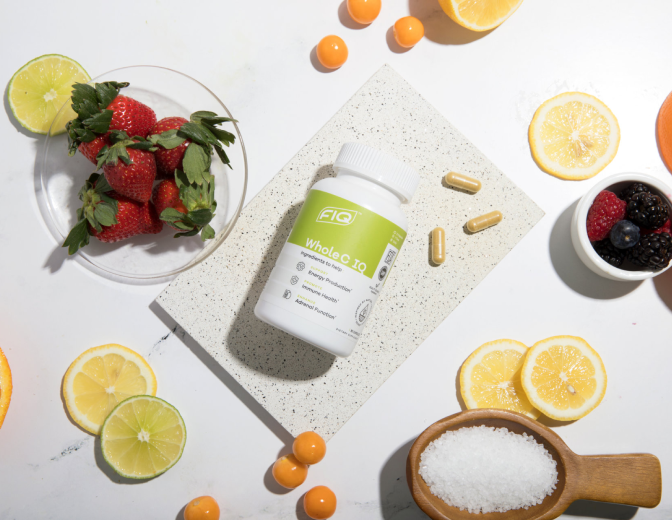Have you given much thought to mucus production? It’s probably not at the top of most people’s health-optimization checklist, and you probably don’t think much about it unless your sinuses produce too much, making breathing difficult.
However, mucus is a vital regulatory mechanism in the body. Without adequate mucus production in the eyes, respiratory, genitourinary, and especially the gastrointestinal tract, we would be in trouble.
Mucus has many essential functions for immune health, offering barrier protection and housing our microbiome. In the gut, it also protects your body from digesting itself (1).
Your stomach acid maintains a pH of about 2.5-3 - acidic enough to fully break down proteins into their individual amino acid building blocks. That would include the lining of your stomach, except that the gastric mucosal layer acts as a barrier to protect you from this (2). Gastric ulcers are often the result of the breakdown of the mucosal lining of the stomach and/or small intestines (3).
The mucosal lining of the gut is also where your microbiome resides. Without a healthy and robust mucosal layer, you cannot support your gut microbiome (1).
Supporting A Healthy Mucosal Layer
A variety of medicinal herbs have been used for centuries for gut health. They are classified as “demucents” and contain a substance called mucilage. This substance creates a slimy, smooth, gel-like substance that closely resembles the texture of mucus.
One such herb is slippery elm. Native Americans have traditionally used the bark of the slippery elm tree for GI issues like diarrhea, gastrointestinal discomfort, and illness; it is also used to soothe sore throats and coughs (4). Slippery elm lozenges are often used in the modern day as a natural remedy for sore throats.
Slippery Elm for IBS
One study investigated the antioxidant properties of slippery elm and other demulcent herbs, finding that slippery elm also acts as an antioxidant in addition to its mucilaginous properties. The researchers suggest that it may be a novel and useful substance in the management of IBS symptoms (5).
Slippery Elm for the Microbiome
While it’s known that a healthy mucosal lining is necessary for your gut microbiome to thrive, slippery elm has also shown prebiotic properties, making it a great food source for beneficial microbes. Studies have found that slippery elm beneficially modulates the gut microbiome by increasing the number of several different genera of microbes, increasing butyrate production via an increase in the number of butyrate-producing bacteria, and improving digestive enzyme production (6).
Slippery Elm for Ulcerative Colitis
An observational study compared the outcomes of ulcerative colitis (UC) patients who used conventional prednisone treatment for UC to those who used a Traditional Chinese Medicine (TCM) blend of slippery elm, fenugreek, and devil’s claw. They found that those following the TCM intervention experienced an 84% efficacy rate compared to a 60% efficacy rate of those treated UC with prednisone (7).
Slippery Elm Improves Leaky Gut
Researchers in Australia investigated the effects of a formula containing slippery elm and various mucilaginous herbs on individuals with various digestive disorders. The study participants experienced improvements to various aspects of gut health, including healing leaky gut (confirmed via the lactulose-to-mannitol ratio test), improved food tolerability, and better microbiome diversity; they also reported improved quality of life after just 4 weeks of daily use of the blend (8).
Slippery Elm for Enhancing the Effectiveness of Probiotics
One study investigated the influence that slippery elm and various mucilagenous herbs had on protecting probiotic microbes in yogurt when exposed to stomach acid, bile, and proteases. Slippery elm protected certain strains from destruction by bile and stomach acid when consumed together (9).
Many probiotics do not survive exposure to stomach acid, bile, and proteases during digestion, bringing to question the efficacy of probiotic supplements by many researchers and providers. Some studies indicate that probiotic supplements are no more effective at improving health outcomes than the placebo effect, indicating that the benefits may be due to placebo (10, 11).
However, a study out of Standford showed that consuming probiotic-rich foods (aka fermented foods) is more effective at improving microbiome diversity than probiotic supplements or increasing fiber intake (12). Thus, ingesting therapeutic herbs such as slippery elm, fermented foods, or probiotic supplementation may be promising for enhancing health outcomes related to probiotic intake (9).
Full-Spectrum Support with Gut IQ
As an evolved and enhanced iteration of FIQs Bone Broth IQ, Gut IQ brings you the same therapeutic benefits of our old Bone Broth formula, now with collagen peptides and the addition of slippery elm.
The ancient wisdom of this traditional herb works in synergy with grass-fed hydrolyzed beef collagen, wakame seaweed, apple cider vinegar, and turmeric to offer a powerhouse of nutrients that support gut integrity and support a stable environment for a thriving gut microbiome.
The pumpkin spice flavor makes for an excellent addition to a favorite probiotic-rich food, yogurt. Or it can be added to teas, oatmeal, protein shakes, or mixed directly with water and enjoyed on it’s own.




